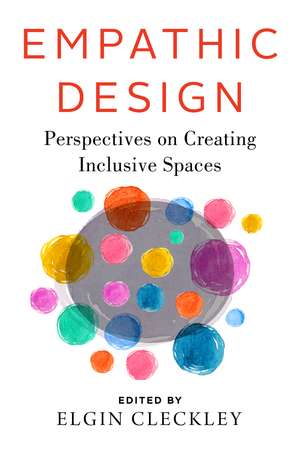Empathic Design: Perspectives on Creating Inclusive Spaces
Editat de Elgin Cleckleyen Limba Engleză Paperback – 16 ian 2024
In Empathic Design, designer and architecture professor Elgin Cleckley brings together leaders and visionary practitioners in architecture, urban design, planning, and design activism to help explore these questions. Cleckley explains that empathic designers need to approach design as iterative, changing, and shifting to say, “we see you”, “we hear you”. Part of an emerging design framework, empathic designers work with and in the communities affected. They acknowledge the full history of a place and approach the lived experience and memories of those in the community with respect.
Early chapters explore broader conceptual approaches, proposing definitions of empathy in the context of design, disrupting colonial narratives, and making space for grief. Other chapters highlight specific design projects, including the Harriet Tubman Memorial in Newark, The Camp Barker Memorial in Washington, D.C., the Freedom Center in Oklahoma City, and the Charlottesville Memorial for Peace and Justice.
Empathic Design provides essential approaches and methods from multiple perspectives, meeting the needs of our time and holding space for readers to find themselves.
Preț: 207.04 lei
Nou
Puncte Express: 311
Preț estimativ în valută:
39.62€ • 43.02$ • 33.28£
39.62€ • 43.02$ • 33.28£
Carte disponibilă
Livrare economică 02-16 aprilie
Livrare express 18-22 martie pentru 24.93 lei
Preluare comenzi: 021 569.72.76
Specificații
ISBN-13: 9781642832051
ISBN-10: 1642832057
Pagini: 208
Ilustrații: 40 photos
Dimensiuni: 152 x 229 x 15 mm
Greutate: 0.34 kg
Editura: Island Press
Colecția Island Press
ISBN-10: 1642832057
Pagini: 208
Ilustrații: 40 photos
Dimensiuni: 152 x 229 x 15 mm
Greutate: 0.34 kg
Editura: Island Press
Colecția Island Press
Notă biografică
Elgin Cleckley is an Assistant Professor of Architecture and Design at the University of Virginia with an appointment in the School of Education and Human Development and the School of Nursing. He is the Director of Design Justice at UVa’s Equity Center (Democracy Initiative Center for the Redress of Inequity Through Community-Engaged Scholarship), where he leads the school’s NOMA Project Pipeline: Architecture Mentorship Program. He is the principal of _mpathic design, a multi-award-winning pedagogy, initiative, and professional practice.
Cuprins
Acknowledgments
Introduction
Elgin Cleckley
Chapter 1: From Empathy to Ethics
by Christine Gaspar
Chapter 2: Making Space for Grief
by Liz Ogbu
Chapter 3: Unseen Dimensions of Public Space: Disrupting Colonial Narratives
by Erin Genia
Chapter 4: Renewing Spatial Agency for a Community: The Freedom Center, Oklahoma City
by Cory Henry
Chapter 5: The Harriet Tubman Memorial, Newark
by Nina Cooke John
Chapter 6: Materializing Memory: The Camp Barker Memorial, Washington, D.C.
by Katie MacDonald and Kyle Schumann
Chapter 7: Practicing _mpathic design: The Charlottesville Memorial for Peace and Justice
by Elgin Cleckley
Chapter 8: Incorporating Empathy: To Middle Species with Love, Columbus, Indiana
by Joyce Hwang
Chapter 9: Teaching Empathic Community Engagement Using Storytelling
by C.L. Bohannon
Afterword: Planning with Purpose: Repairing Past Harm with Empathy
by Mitchell J. Silver
Notes
About the Editor
About the Contributors
Index
Introduction
Elgin Cleckley
Chapter 1: From Empathy to Ethics
by Christine Gaspar
Chapter 2: Making Space for Grief
by Liz Ogbu
Chapter 3: Unseen Dimensions of Public Space: Disrupting Colonial Narratives
by Erin Genia
Chapter 4: Renewing Spatial Agency for a Community: The Freedom Center, Oklahoma City
by Cory Henry
Chapter 5: The Harriet Tubman Memorial, Newark
by Nina Cooke John
Chapter 6: Materializing Memory: The Camp Barker Memorial, Washington, D.C.
by Katie MacDonald and Kyle Schumann
Chapter 7: Practicing _mpathic design: The Charlottesville Memorial for Peace and Justice
by Elgin Cleckley
Chapter 8: Incorporating Empathy: To Middle Species with Love, Columbus, Indiana
by Joyce Hwang
Chapter 9: Teaching Empathic Community Engagement Using Storytelling
by C.L. Bohannon
Afterword: Planning with Purpose: Repairing Past Harm with Empathy
by Mitchell J. Silver
Notes
About the Editor
About the Contributors
Index
Recenzii
“What becomes evident is that, for years, decisions have been made about public spaces without insight from the majority of those who are affected by and would possibly benefit from those decisions, if given the opportunity. The photographs and drawings are black and white but give a clear indication of the problems that still exist and potential ways of hopefully solving them.”
"In this generous collection of essays, curated by Elgin Cleckley, designers and planners share why and how they make places for multiple voices by engaging in deep listening that recognizes differences in experience of communities across the neighborhood and around the globe. The principle of empathic design draws from place histories to share the diverse ways in which communities are nurtured reminding planners and designers to slow down, engage, and listen if they are to truly serve the people and land to which they are accountable."
"Empathic Design is an eye-opening book. It is a clear, concrete exploration of what 'equity and justice,' and 'shared emotion' can mean in the public spaces we build. Professor Cleckley has brought together a group of sophisticated professionals who are actively designing and building places that speak to, and support underserved Black and Native American communities. Training themselves in deeply empathetic approaches to design, they weave stories of hidden histories and living culture into the life of cities."
Descriere
How do you experience a public space? Do you feel safe? Seen? Represented? The response to these questions may differ based on factors including your race, age, ethnicity, or gender identity. In Empathic Design, designer and architecture professor Elgin Cleckley brings together leaders and visionaries in architecture, urban design, planning, and design activism to explore what it means to design with empathy. Empathic designers work with and in the communities affected. They acknowledge the full history of a place and approach the lived experience and memories of those in the community with respect.
Contributors explore broader conceptual approaches and highlight design projects including the Harriet Tubman Memorial in Newark, which replaced a long-standing statue of Christopher Columbus; and restoration of the Freedom Center in Oklahoma City, first built by civil activist Clara Luper to provide a safe place for gathering and youth education; and The Camp Barker Memorial in Washington, D.C., which commemorates a “contraband camp” used to house former slaves who had been captured by the Union Army.
Empathic Design provides essential approaches and methods from multiple perspectives, meeting the needs of our time and holding space for readers to find themselves.
Contributors explore broader conceptual approaches and highlight design projects including the Harriet Tubman Memorial in Newark, which replaced a long-standing statue of Christopher Columbus; and restoration of the Freedom Center in Oklahoma City, first built by civil activist Clara Luper to provide a safe place for gathering and youth education; and The Camp Barker Memorial in Washington, D.C., which commemorates a “contraband camp” used to house former slaves who had been captured by the Union Army.
Empathic Design provides essential approaches and methods from multiple perspectives, meeting the needs of our time and holding space for readers to find themselves.


















